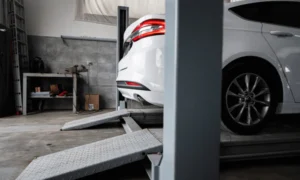Understanding Chevy car warranties and extended coverage is essential for making informed decisions about your vehicle purchase and ownership experience. Whether you’re considering Chevy cars for sale in Ticonderoga, NY, or elsewhere, car warranties and extended coverage offer protection against unexpected repair costs and ensure that your vehicle remains in good working condition throughout its life. However, navigating the complexities of these warranties can be challenging without proper guidance.
This article provides expert advice on understanding Chevy car warranties and extended coverage, helping you make the most of the protection and benefits available. By grasping these key concepts, you can confidently choose the right coverage for your Chevy and ensure a smoother ownership experience.
Grasping the Basics of Chevy’s Factory Warranty
Chevy’s factory warranty is the standard coverage that comes with a new vehicle, offering fundamental protection against defects and malfunctions. It is crucial to understand the specifics of this warranty, including its duration, coverage details, and limitations. Typically, Chevy’s factory warranty includes a basic limited warranty, a powertrain warranty, and sometimes a corrosion warranty.
The basic limited warranty covers most components of your Chevy for a specific period or mileage, whichever comes first. This usually includes the cost of parts and labor for repairs due to defects in materials or workmanship. The powertrain warranty extends coverage to the engine, transmission, and drivetrain components, protecting issues that may arise in these critical systems.
Understanding the terms and conditions of your factory warranty, such as what is covered and what is not, is essential. For instance, routine maintenance and wear-and-tear items like brake pads or tires are typically not covered. Familiarizing yourself with these details will help you manage expectations and make informed decisions about your vehicle’s care.
Exploring the Benefits of Extended Coverage
Extended coverage, often available through Chevy’s extended warranty programs or third-party providers, offers additional protection beyond the factory warranty. This type of coverage is particularly valuable for those who plan to keep their vehicle for an extended period or exceed the factory warranty’s mileage limits.
Extended warranties can provide peace of mind by covering repairs and services that may not be included in the factory warranty. This includes additional protection for components that might wear out over time, such as the electrical system, air conditioning, or advanced technology features. Extended coverage can also include perks like roadside assistance, rental car reimbursement, and trip interruption benefits, adding extra value to your warranty package.
When considering extended coverage, it is important to evaluate the terms carefully. Look for details about what is covered, any exclusions, and the duration of coverage. Compare different extended warranty plans to find one that aligns with your needs and budget. Understanding these aspects will help you choose a plan that provides comprehensive protection and suits your ownership plans.
Understanding Warranty Transferability
Warranty transferability refers to the ability to transfer the remaining warranty coverage from the original owner to a new owner if you sell your Chevy. This feature can significantly impact the resale value of your vehicle. Prospective buyers often view transferable warranties as a valuable benefit, as it provides them with continued protection and reassurance.
Chevy’s factory warranties are typically transferable, but there may be specific conditions or procedures required to complete the transfer. It’s important to follow the proper steps to ensure that the new owner benefits from the remaining warranty coverage. Additionally, understanding the transferability of any extended coverage you purchase is crucial. Some extended warranties are also transferable, which can enhance the appeal of your vehicle to potential buyers.
Before selling your Chevy, review the warranty transfer process and ensure that all necessary paperwork is completed. Providing a transferable warranty can make your vehicle more attractive in the used car market and potentially increase its resale value.
Evaluating Coverage for Common Wear-and-Tear Issues
Chevy’s factory warranty and extended coverage may have limitations when it comes to common wear-and-tear issues. Understanding what is covered and what is not is crucial for managing your vehicle’s maintenance and repair costs. Wear-and-tear items, such as brake pads, tires, and wiper blades, are typically not covered under standard warranties.
Extended warranties might offer coverage for some of these wear-and-tear items, depending on the plan. When evaluating extended coverage options, check whether they include protection for common maintenance items and potential issues that could arise over time. This can provide added peace of mind and reduce out-of-pocket expenses for repairs and replacements.
Consider your driving habits and typical wear-and-tear issues when selecting an extended warranty. For example, if you frequently drive in harsh conditions or have high mileage, a plan that covers additional wear-and-tear items might be more beneficial. Tailoring your coverage to your specific needs can ensure that you receive the protection you require throughout your vehicle’s life.
Reviewing Claim Procedures and Customer Service
Understanding the claim procedures and customer service aspects of your warranty coverage is essential for a smooth ownership experience. When a repair or service is needed, knowing how to file a claim and what steps are involved can save time and reduce stress. Chevy’s factory warranty and extended coverage programs should provide clear instructions on how to initiate claims and access authorized repair facilities.
Evaluate the customer service reputation of the warranty provider, including Chevy’s warranty services and any third-party extended warranty providers. Positive customer service experiences often involve responsive support, efficient claims processing, and helpful representatives who can guide you through the process.
Before committing to an extended warranty, research customer reviews and ratings to gauge the quality of service provided. Ensuring that you have reliable support and a straightforward claims process will enhance your overall satisfaction with the warranty coverage and contribute to a better ownership experience.
Conclusion
Understanding Chevy car warranties and extended coverage is crucial for making informed decisions about your vehicle purchase and ongoing maintenance. By grasping the basics of the factory warranty, exploring the benefits of extended coverage, understanding warranty transferability, evaluating coverage for wear-and-tear issues, and reviewing claim procedures and customer service, you can ensure that you select the right protection for your Chevy.
A well-chosen warranty and extended coverage plan not only provide financial protection against unexpected repair costs but also enhance your overall ownership experience. With expert advice and careful consideration, you can confidently navigate the world of warranties and coverage options, ensuring that your Chevy remains in excellent condition and serves you well for years to come.



































